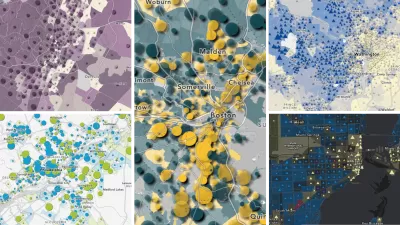In coming weeks doctoral applications in planning are due. Why apply? For professional planners, a PhD sometimes sounds interesting compared with doing a regular job in a municipality. Some designers remember studio professors who seemed to float into class, unprepared, for a few hours per week. Compared with the ups and downs of private design practice, this can seem quite appealing. Of course, some people genuinely like studying and research, want to make a contribution in that area, and have a flair for teaching.
In coming weeks doctoral applications in planning are due. Why apply?
For professional planners, a PhD sometimes sounds interesting compared with doing a regular job in a municipality. Some designers remember studio professors who seemed to float into class, unprepared, for a few hours per week. Compared with the ups and downs of private design practice, this can seem quite appealing. Of course, some people genuinely like studying and research, want to make a contribution in that area, and have a flair for teaching.
But is it for you? Maybe not.
While it looks as if academics work only a few hours per week, and some notoriously do, for the vast majority of faculty members this is a full-time calling requiring one work many, many hours per week. Time studies of academics show a lot of this is administration of various sorts. Research, far from being glamorous, is mostly pretty mundane; the other part is difficult.
While many people doing PhDs don't become faculty members, but move into other positions, it is important to consider whether the PhD is really needed for such work. Might a second masters degree, say in statistics or public health, equip you as well and at a more modest opportunity cost? You may better paid as well!
It isn't a way to avoid the world of practical work either. Dr. Jennifer Dill from Portland State has good advice at: http://web.pdx.edu/~jdill/resources.php
"I encourage all prospective PhD students to think about and clearly articulate why they want to pursue a PhD. Too often I encounter masters students who really enjoy the topics they are studying and want to continue doing so and thus enter a PhD program. Simply wanting to continue learning about a topic isn't enough for pursuing a PhD. I also generally recommend that in the field of planning, students get some professional experience before pursuing the PhD."
In the past it may have been be possible to find a teaching job without planning work experience. These days most programs want people with advanced research skills who can also teach basic planning workshops and studios or do outreach in communities. Those without such skills and experiences are passed over--with a few exceptions typically limited to highly specialized, technical sub-fields.
So, overall, you have to really like research and teaching and be prepared to pay some opportunity costs. I have a PhD but obviously don't recommend it for everyone.
If you are still interested after reading this what should you do?
You should try out doing research, perhaps in your masters degree, perhaps as part of your job, or maybe as a volunteer. I have some advice aimed at students doing exit projects, but including a useful reference list, at: http://www.annforsyth.net/CRP_ForsythEssentialInfo_070710clean.pdf. Some of my blogs on exit project may also be helpful: choosing an exit option, getting started, troubleshooting common problems, managing your committee, using sources, writing a literature review, and actually finishing.
You should try teaching or public speaking, for example delivering a conference paper. Some like doing this but others don't.
You should read research in the areas that interest you, figure out where the authors are from, and identify schools with at least two potential supervisors (two because you need to be able to choose among them for good fit, plus someone will likely be on leave at some time). Look for research and not professional or journalistic work.
You should NOT necessarily email faculty members about your work. My advice is only do so if they specifically request it (on their web site or as part of the application). I respond to such letters with a standard reply because there is a general admissions process where I work and I want to allocate my time to enrolled students. However, universities differ and some faculty members like such contacts.
Overall, it is a complex decision, not an easy choice.
In future blogs I will go back to my focus on masters and undergraduate students.

Planetizen Federal Action Tracker
A weekly monitor of how Trump’s orders and actions are impacting planners and planning in America.

Restaurant Patios Were a Pandemic Win — Why Were They so Hard to Keep?
Social distancing requirements and changes in travel patterns prompted cities to pilot new uses for street and sidewalk space. Then it got complicated.

Map: Where Senate Republicans Want to Sell Your Public Lands
For public land advocates, the Senate Republicans’ proposal to sell millions of acres of public land in the West is “the biggest fight of their careers.”

Maui's Vacation Rental Debate Turns Ugly
Verbal attacks, misinformation campaigns and fistfights plague a high-stakes debate to convert thousands of vacation rentals into long-term housing.

San Francisco Suspends Traffic Calming Amidst Record Deaths
Citing “a challenging fiscal landscape,” the city will cease the program on the heels of 42 traffic deaths, including 24 pedestrians.

California Homeless Arrests, Citations Spike After Ruling
An investigation reveals that anti-homeless actions increased up to 500% after Grants Pass v. Johnson — even in cities claiming no policy change.
Urban Design for Planners 1: Software Tools
This six-course series explores essential urban design concepts using open source software and equips planners with the tools they need to participate fully in the urban design process.
Planning for Universal Design
Learn the tools for implementing Universal Design in planning regulations.
Heyer Gruel & Associates PA
JM Goldson LLC
Custer County Colorado
City of Camden Redevelopment Agency
City of Astoria
Transportation Research & Education Center (TREC) at Portland State University
Camden Redevelopment Agency
City of Claremont
Municipality of Princeton (NJ)





























